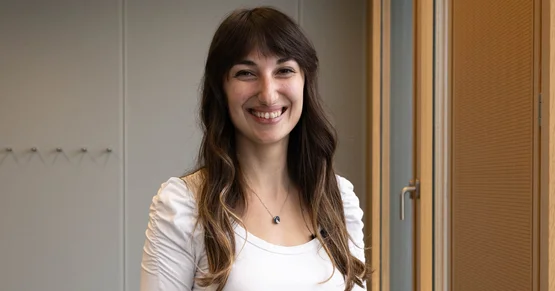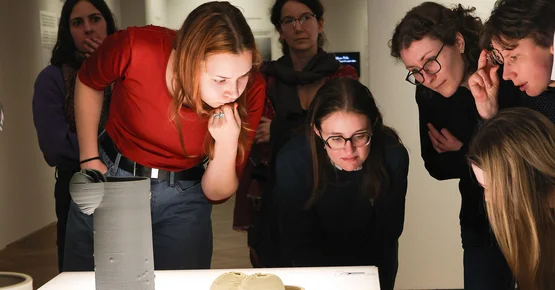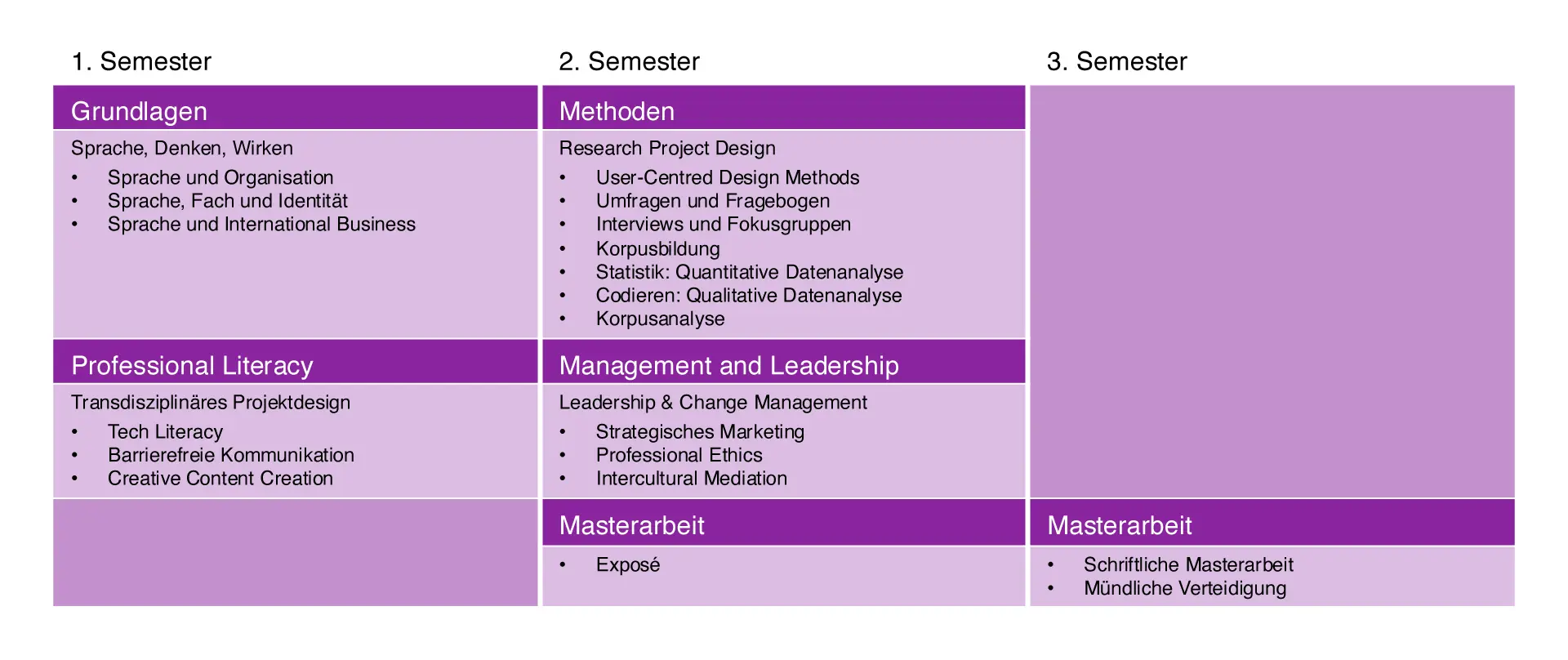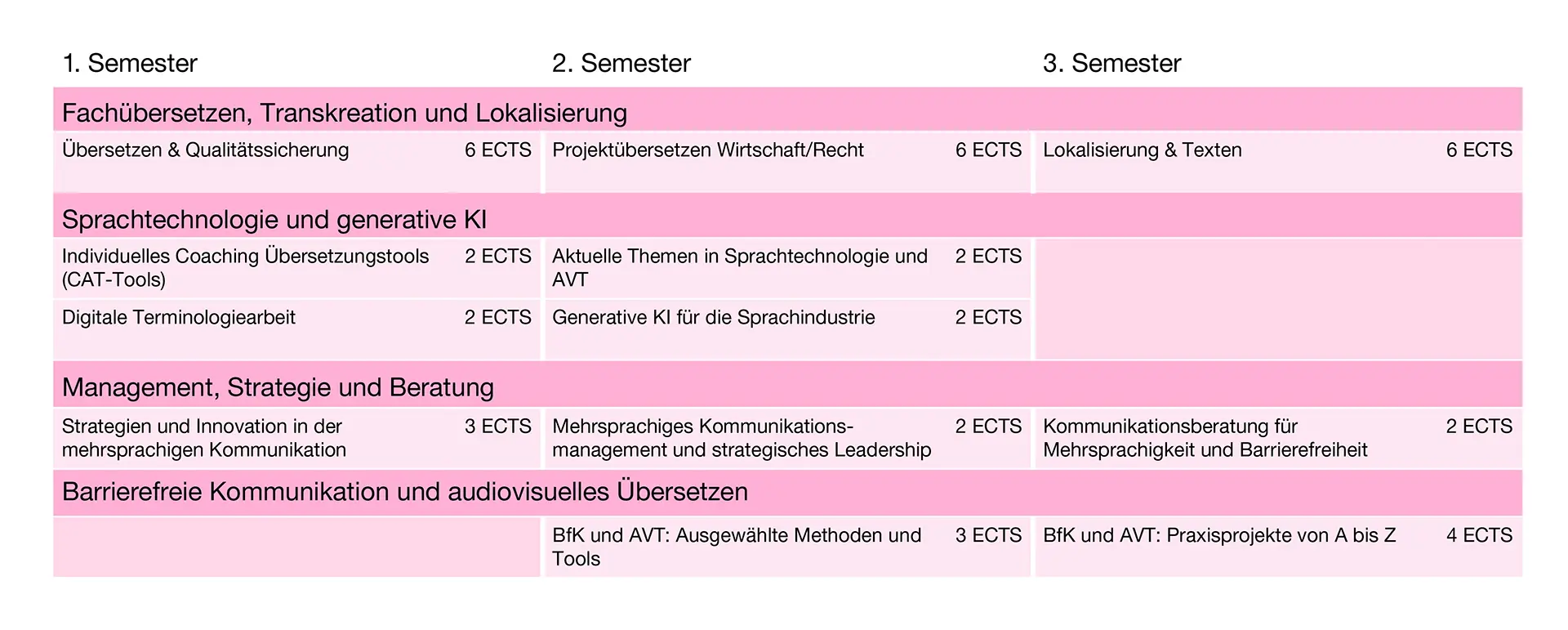Specialisation in Multilingual Communication Management
Shape the multilingual communication of the future: in the Master's specialisation in Multilingual Communication Management, you learn how to strategically manage multilingual communication, enable accessible communication and advise companies to help them expand their global reach.
In the Master’s specialisation in Multilingual Communication Management, you develop your feel for language, apply your creativity and build expertise in language technologies. You become part of a community that drives innovation in language technology, pushes boundaries and reimagines multilingual communication at the interface between languages, cultures, technology and international management.
Insights into the degree programme
-

Augmented Translation bringt neue Möglichkeiten. Ein Alumniportrait
Jessica Selinger ist Übersetzerin beim Bund und Expertin für KI beim Übersetzen. Die Absolventin des Masters Language and Communication hat schon im Studium angefangen, mit Maschineller Übersetzung zu ...
-

Game-Lokalisierung ist kein Kinderspiel
Wie beeinflusst Game-Lokalisierung das Spielerlebnis und warum ist sie entscheidend für den Erfolg von Videospielen? In ihrer Masterarbeit hat sich die passionierte Gamerin Christina Capizzi mit der ...
-

«Übersetzen in Leichte Sprache ist gar nicht so leicht»
Studierende der Mastervertiefung Multilingual Communication Management (bisher: Fachübersetzen) haben für eine Kunstausstellung im Gewerbemuseum Winterthur Texte in Leichte Sprache übersetzt. Was die ...
Career opportunities
You can find information on career opportunities on the German-language website.
Key information
Specialisation modules
You can find detailed information on the programme content on the German-language website.
Languages of study
In the programme, you take two or three languages of study: your native or dominant language (A language) and either an active foreign language (B language) or two passive second languages (C languages). You translate out of your B and C languages into your A language and out of your A language into your B language. You therefore take two language versions with either AB or ACC as your language combination. One of the languages you pursue must be German.
The results you achieve in the professional aptitude test will determine which of your languages is classified as A, B and/or C.
The table below gives you an overview of the languages and language combinations we currently cover in the specialisation in Multilingual Communication Management. The MA programme director reserves the right to cancel a language version if there are not enough students enrolled.
| A language | B or C languages | C language only |
|---|---|---|
| German | French, English, Italian, Spanish | Chinese |
| French | German, English, Italian | |
| Italian | German, English, French | |
| English | German, French, Italian, Spanish | |
| Spanish | German, English |
Part-time study
You can choose to complete the MA in Language and Communication on either a full-time or part-time basis. The full-time programme is designed to be completed over three semesters. A part-time programme lasts between four and six semesters and can be applied for in writing via the academic office both prior to the commencement of the MA programme and during your studies (subject to certain conditions).
Admission
Successful candidates have:
- strong written communication skills in diverse contexts, a quick understanding and good powers of concentration; they are creative in their approach to problem-solving, intellectually curious and are able to deal with criticism and to cope with pressure;
- a good general education as well as a thorough knowledge of economic, social, political and cultural conditions in the cultural areas of their chosen languages;
- an outstanding command of their native language and at least one foreign language.
Before you begin your studies, we recommend you do an internship in translation or the language service industry, preferably abroad in a country where one of your foreign languages is spoken. This will give you the chance to gain useful professional experience and to establish contacts, while improving your language skills and enhancing your cultural knowledge.
Prior to starting your studies, you have the opportunity to complete an online bridging course. This self-study course allows you to prepare for the Master’s degree programme with selected reading material and translation exercises. You will be provided with further information after submitting your application.
You must fulfil the following formal conditions in order to be admitted to the programme:
- Bachelor’s degree
You must hold a recognised Bachelor’s degree or an equivalent tertiary level qualification. - Professional aptitude test
The written professional aptitude test for the specialisation in Multilingual Communication Management is designed to assess your practical skills. In the test, you translate a general language text from your chosen foreign languages (B and/or C languages) into your native language (A language) and, if applicable, from your native language (A language) into one active foreign language (B language). To be admitted to the programme, you must achieve the language combinations ACC or AB. You may register for a maximum of two B languages and four C languages for the professional aptitude test.
Information sheet on the professional aptitude test (in German) - Language competence (English/German)
To be admitted to the programme, you must have English language competence of at least C1 level and, in the case of non-native speakers of German, German language competence of at least C2 level. You will have to provide evidence in the form of language certificates, study records or job references. If you are unable to provide evidence of this kind, you will be required to take a written language test at the ZHAW.
Please note that individuals who have been excluded from a Master’s degree programme at other universities that covers equivalent content can no longer be admitted to the corresponding specialisation at the ZHAW.
Dates and deadlines
Applying in good time will allow you to optimally plan and prepare for your studies. On request, applications submitted at a later date may be considered. Please contact the degree programme office in this regard directly by sending an e-mail to master.linguistik@zhaw.ch.
| Programme start: Spring semester 2027 | |
|---|---|
| Deadline for applications 1 | 15 May 2026 |
| Professional aptitude test 1 | 22 June – 3 July 2026 |
| Language test 1 | 7 September 2026 |
| Deadline for applications 2 | 30 September 2026 |
| Professional aptitude test 2 | 26 October – 6 November 2026 |
| Language test 2 | 9 November 2026 |

